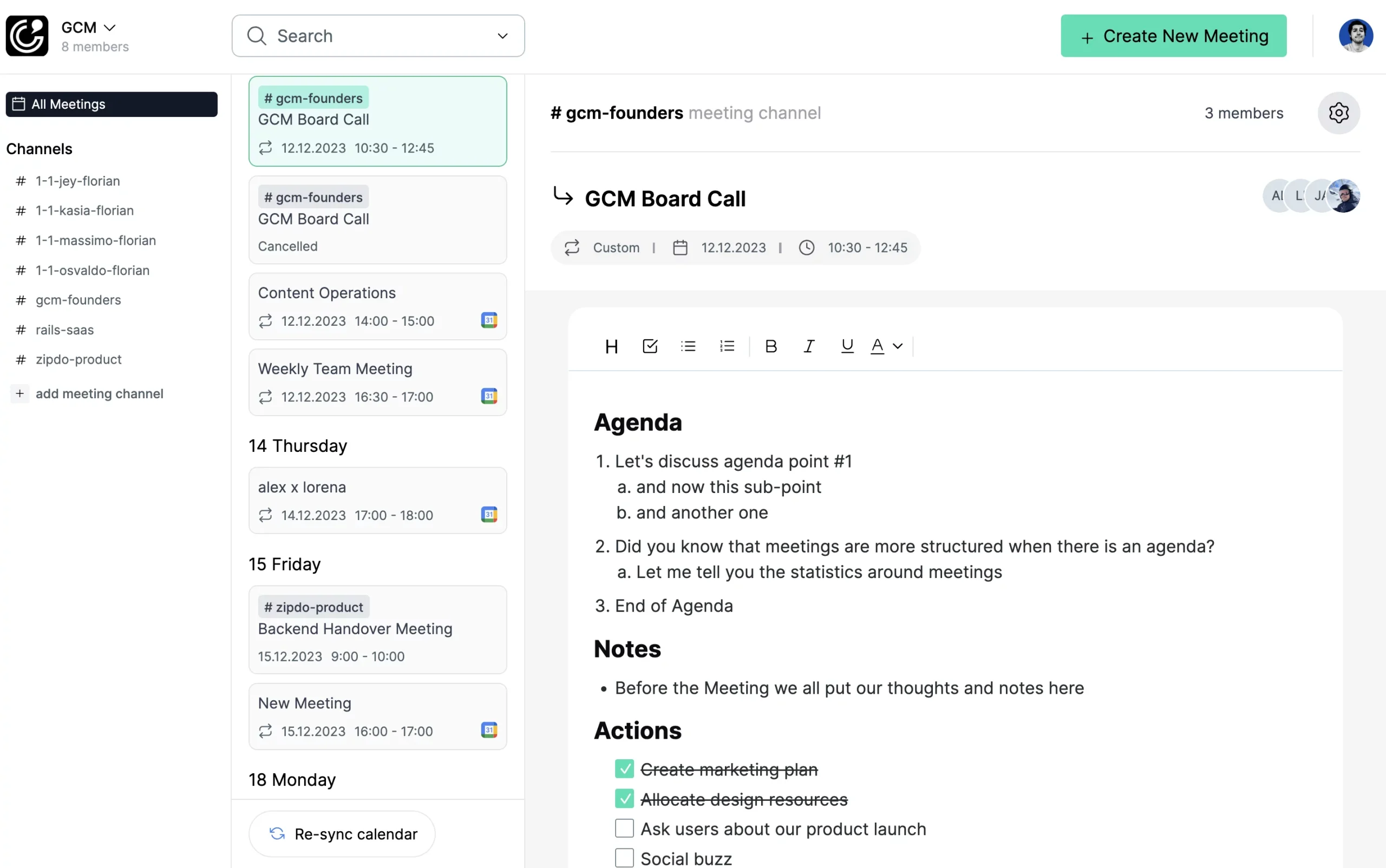Asynchronous Meeting Software is a type of software that enables teams or individuals to collaborate and communicate effectively without the requirement of being available at the same time. This software is designed to facilitate information sharing, collaboration and decision-making in an asynchronous manner, meaning input can be given and tasks can be completed at any time that suits the participants. This is particularly vital for teams dispersed across different time zones or with flexible working hours. Key features of such software can include discussion threads, document sharing, task assignment and progress tracking, all designed to keep teams aligned and projects on track despite disparate schedules.
The Best Products
Asynchronous Meeting Software: Our Recommendations
Pick #1: Our Software
ZipDo
ZipDo, an innovative cloud-based platform for meeting notes, revolutionizes collaborative efforts in teams by completely changing how notes from meetings are managed, organized, and disseminated. Working perfectly with Asynchronous Meeting Software, it promises real-time notation, collaborative edits, and syncs seamlessly with your preferred calendars and productivity tools, making it an essential tool for both small and large teams.
One of ZipDo’s defining features is the real-time note-taking capability. This ensures everyone in any meeting initiated with Asynchronous Meeting Software remains in sync, thus eliminating the outdated method of manually passing notes around. Once the meeting concludes, the team members can easily make adjustments to the notes to ensure they reflect the most recent discussions.
Additionally, ZipDo shines in its note organization feature. By categorizing notes into distinct channels or folders, the platform guarantees ease of access. The notes are also searchable, allowing you to quickly find specific details without scrolling endlessly or conducting manual searches.
In terms of note sharing, ZipDo assures a secure way to share critical information with team members, clients, or partners through its granular access control. Automated integration with calendars means that notes for each meeting generated through Asynchronous Meeting Software are done so without the need for manual input.
In conclusion, ZipDo is a user-centric platform that offers extensive features to improve team productivity, collaboration, and project management, particularly when paired with an Asynchronous Meeting Software. Its features – real-time note-taking, collaborative editing, easy organization, efficient searchability, secure sharing, and automated integrations – make it a powerful tool that eases meeting management and ensures a smooth progression of projects.
Pick #2
Slack
Slack is a digital hub that brings remote teams together, effectively allowing them to hold asynchronous meetings. It’s a cloud-based collaboration tool that facilitates communication through various chat rooms (channels), private messages, voice or video calls, and file sharing. It reduces the need for synchronous communication which often disrupts workflow, allowing team members to consume and respond to information at their own pace. Slack integrates with a multitude of other applications, making it an efficient workspace that can centralize conversations, files, tools, and people, thereby improving productivity and efficiency in remote and flexible working environments.
Pick #3
Zoom

Zoom is a leading video conferencing software that facilitates both synchronous and asynchronous meetings. As an asynchronous meeting software, it allows users to engage in meetings without being present at the same time. zoom enables organizations to record meetings, presentations, webinars, and even one-on-one conversations. The recorded content can later be accessed and viewed by individuals at a different time that suits them, thus not necessitating real-time attendance. This feature facilitates effective communication for participants across different time zones or for those unable to attend a live meeting, aiding in flexibility, enhanced productivity, and improved collaborations within global teams.
Pick #4
Loom
Loom is an asynchronous meeting software that serves as a powerful communication tool, especially for remote teams. It allows users to create and share quick videos, providing a more efficient and engaging way to communicate than traditional text or live video conferencing. Users can record their screen, voice, and face to deliver messages, explain tasks, or give feedback, among other uses. These videos can be watched at any time, making it convenient for team members across different time zones, hence promoting asynchronous communication. It’s a practical solution for minimizing unnecessary meetings and improving overall productivity within a team.
Pick #5
Microsoft Teams
Microsoft Teams is a robust, cloud-based collaboration tool and Asynchronous Meeting Software that facilitates seamless team communication and project management, regardless of geographical location or time zone. It allows team members to engage in group discussions, one-on-one chats, video conferencing and share documents and files in an orderly manner, even outside of live meetings. Its asynchronous nature enables team members to contribute to discussions, review task updates and access meeting records at their own convenience, making it an integral communication tool for modern workplaces, particularly those employing remote or flexible working arrangements. Microsoft Teams seamlessly integrates with various other software, including Microsoft’s own suite of products, optimizing workflow and productivity.
Pick #6
Google Meet
Google Meet is Google’s premier video conferencing software, designed for professional or educational collaboration in real time. However, it doesn’t fall under the category of “Asynchronous Meeting Software”. Asynchronous, in the context of software services, refers to interaction that doesn’t happen in real-time, like email or discussion boards where attendees can participate at their own convenience. Google Meet, on the other hand, is a synchronous platform where discussions and interactions are held in real-time, providing instant communication and collaboration. While it allows recording meetings for later viewing, the primary functionality revolves around live, real-time interaction.
Pick #7
Asana
Asana is an asynchronous meeting software that functions as a project management tool, aimed to help teams organize, track, and manage their work. It allows users to create to-do lists for ongoing projects, set reminders for upcoming deadlines, and send requests to colleagues. Asana supports collaboration and communication, facilitating efficient and effective remote and distributed work. Furthermore, because it is asynchronous, team members can provide input, updates, or ask questions at a time that suits them the best without slowing down the project progress. With built-in features to visualize progress, teams can also save time on status meetings and written reports.
Pick #8
Trello

Trello is a collaborative tool that allows teams to organize their work and tasks into boards. As an asynchronous meeting software, Trello provides a visual way to see who is working on what, tracking progress and managing projects in real-time, thus enabling team members to communicate and collaborate effectively without the need for constant live meetings. This means teams can work independently on their tasks and update their progress at their own pace while still staying interconnected, making it an excellent tool for remote teams working across different time zones. In this way, Trello eliminates the need for back-to-back meetings, enhancing productivity and efficiency.
Pick #9
Basecamp
Basecamp is a popular web-based asynchronous meeting software designed to support project management and team communication, enabling teams to collaborate and work remotely with ease. It offers a variety of features including to-do lists, message boards, schedules, documents and files storage, real-time chat, and check-in questions to keep everyone informed and aligned. Basecamp’s asynchronous capability allows team members to contribute to discussions, share updates, and complete tasks in their own time, thus avoiding the need for simultaneous presence, reducing distractions, and promoting more focused and productive work.
Pick #10
Twist

Twist is an asynchronous meeting software designed to aid communication and collaboration in remote or distributed teams. Unlike traditional real-time chat apps, it prioritizes organized, threaded conversations that allow team members to contribute at their own pace, eliminating the pressure to respond immediately and enhancing focus time. Also equipped with advanced features like integrated to-dos, powerful search, and apps & integrations, Twist facilitates a more asynchronous, less distracting approach to team communication, making it an ideal tool for diversified and geographically dispersed teams.
Pick #11
WorkFlowy
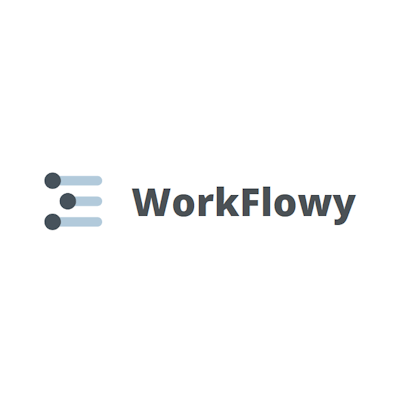
WorkFlowy, as an asynchronous meeting software, functions as an innovative tool to streamline team projects and communication outside of typical time-bound conventions. It enables individuals and teams to organize tasks, manage projects, and exchange information seamlessly without requiring simultaneous participation. The software provides a versatile platform where users can interactively create, share and delegate tasks, document meeting notes and project updates in a nested list format. Moreover, it highlights a unique feature to bullet point information, which can be collapsed and expanded creating a clean and easy-to-navigate visual structure. Overall, WorkFlowy fosters collaboration, productivity, and organized work structure, even when teams operate across different time zones and schedules.
Asynchronous Meeting Software: Key Features
Asynchronous meeting software revolutionizes the way teams communicate by breaking free from the constraints of real-time interactions. One of its key features is the ability for team members to contribute at their own pace, ensuring everyone has the opportunity to share insights and feedback without the pressure of a live meeting environment. This flexibility is particularly beneficial for teams spread across various time zones, allowing for more inclusive and comprehensive collaboration. The software typically supports a variety of multimedia content, such as video messages and screen recordings, making the exchange of complex ideas and instructions more effective than traditional text-based communication.
Another standout feature of asynchronous meeting software is the integration of organizational tools that streamline the workflow. These may include task assignments, progress tracking, and deadline reminders, all within the same platform used for communication. This consolidation of functions fosters a more organized approach to project management and enhances productivity. Additionally, these platforms often feature robust search capabilities and content categorization, making it easy for team members to locate past discussions and decisions. This not only saves time but also helps in maintaining a clear, accessible record of team interactions and project evolution.
Buying Criteria
Choosing the right asynchronous meeting software requires a thoughtful balance between feature sets and user experience. Begin by assessing the specific needs of your team such as scalability, ease of use, and the types of communication supported (e.g., video, text, or voice). Essential features might include task assignment, progress tracking, and integrations with other tools your team uses. Look for platforms that offer robust documentation and responsive customer support to smooth over any learning curves and help your team adapt to the new system efficiently.
Additionally, security and privacy features should never be overlooked when selecting asynchronous meeting software. Ensure that the platform you choose complies with industry standards for data protection and offers end-to-end encryption to safeguard your communications. Also, consider the software’s ability to archive conversations and files in an organized manner, enabling easy retrieval for future reference or compliance purposes. By carefully evaluating these aspects, you can select a platform that not only enhances communication within your team but also contributes to a more productive and secure workflow.
Benefits
Investing in asynchronous meeting software makes eminent sense for organizations that span across multiple time zones, where synchronizing schedules for live meetings becomes a logistical nightmare. It is also ideal for teams that value flexibility, allowing members to contribute at their peak productivity hours rather than being bound to a set meeting time. Companies focusing on deep work and minimizing interruptions would find such software a boon, as it facilitates continuous workflow while still ensuring collaboration and communication. This investment is particularly worthwhile for projects requiring thoughtful, detailed responses, enabling team members to digest information and contribute more meaningfully at their own pace.
Conversely, it may not be wise to invest in asynchronous meeting software for small teams or startups operating within a single time zone, where scheduling live meetings is relatively straightforward. In environments where real-time feedback and instant decision-making are critical for rapid development cycles, the delayed nature of asynchronous communication could hinder rather than help. Additionally, teams that thrive on the energy and dynamism of live interactions, or where building team spirit and culture relies heavily on real-time engagement, might find asynchronous tools dilute the essence of their collaboration. In such cases, the investment might not only be unnecessary but could potentially impede the team’s effectiveness and morale.
Popular Questions
What is Asynchronous Meeting Software?What are some examples of Asynchronous Meeting Software?How can Asynchronous Meeting Software improve productivity?Can Asynchronous Meeting Software totally replace in-person or synchronous online meetings?What are the key features to look for in an Asynchronous Meeting Software?
Asynchronous meeting software refers to a platform or program that allows team members to collaborate, discuss, and share ideas without having to be present in real-time. Messages, documents or files are shared that can be accessed and responded to at the user’s own availability.
Some common examples of asynchronous meeting software include email platforms like Microsoft Outlook or Gmail, project management tools like Asana or Trello, collaborative tools like Google Docs or Microsoft 365, and cloud storage services like Dropbox or Google Drive.
Asynchronous meeting software can improve productivity by eliminating unnecessary meetings, allowing team members to collaborate on their own time, enabling efficient document sharing and editing, facilitating effective project tracking, and by preventing miscommunication or oversight through centralizing information.
While asynchronous meeting software greatly enhances flexibility and efficiency, they cannot completely replace synchronous meetings. Some discussions or decisions may require real-time conversations, especially for topics that need immediate feedback or when nuanced conversations are needed. Combining both synchronous and asynchronous methods often yields the best results.
Key features to look for would include user-friendly interface, real-time updating or notifications, integration capabilities with other software, adequate security measures for data protection, tools for collaboration and task management, and good file storage and sharing options.

